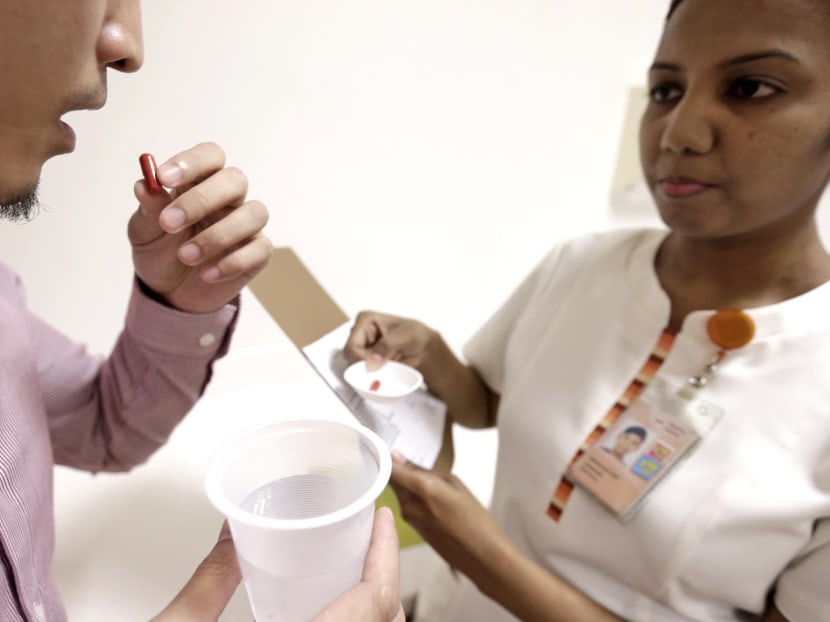Almost half of those on TB treatment develop negative feelings: Study
SINGAPORE — When tuberculosis (TB) patient Ms Maru (not her real name) went for her first day of Direct Observed Therapy (DOT) at the polyclinic, she felt it was a waste of her time.

A TB patient under Directly Observed Therapy (DOT) at a polyclinic on July 12, 2016. Photo: Wee Teck Hian/TODAY
SINGAPORE — When tuberculosis (TB) patient Ms Maru (not her real name) went for her first day of Direct Observed Therapy (DOT) at the polyclinic, she felt it was a waste of her time.
A daily session, which includes consuming a cocktail regimen of 11 pills under the supervision of nurses, takes up around 45 minutes, with the bulk of her time spent on commuting.
Now four months into treatment, the 44-year-old woman, who was diagnosed with TB in March this year, no longer regarded DOT as a hassle, as she wants to recover fully from the disease.
Under DOT, advocated by the World Health Organisation as the standard of care for TB patients, healthcare providers, such as nurses, supervise the patients while they take their pills.
TB patients on DOT here, who do not have to pay for their medication, have to complete six to nine months of the therapy. Patients with multi-drug resistant strains of the airborne disease have to complete up to 18 months of treatment.
A study among 356 tuberculosis patients undergoing DOT in Singapore found that they often chalk up expenses such as transport costs, with some developing feelings of anxiety and depression.
Sharing the findings on Tuesday (July 12), the team of researchers from SingHealth Polyclinics found that participants incur expenses averaging between S$260 and S$389 on DOT-related costs, while undergoing treatment.
Almost half the participants reported reduced social functions, while 45 per cent noted disruption of work, social and school activities.
Persons with TB need to be in close and prolonged contact with other people to spread the disease to them. TB is spread through fine respiratory droplets from the infected person.
The researchers, led by Nurse Clinician Lee Hwee Khim, also found that 34 per cent of participants were afraid of disclosing to anyone that they were on DOT for TB treatment, and nearly three-quarters of the participants also reported that they experienced negative feelings such as anxiety and depression.
Some of these issues may potentially lead to patients defaulting on treatment, the researchers noted.
Hence, healthcare professionals should assist and support patients on DOT, beyond supervision, to explore the psychosocial issues affecting patients, they added.
For example, nurses at SingHealth polyclinics currently direct patients with financial issues to polyclinic medical social workers for further assistance.
In addition, public health campaigns should focus on raising awareness of the relevance and importance of completing DOT among employers, said the researchers.
In the study, 21 per cent of participants felt that their employers were unhappy because DOT disrupted their work schedules and duties.
Dr Tan Ngiap Chuan, director of research at SingHealth Polyclinics, and one of the researchers, also pointed towards “leveraging on technology” to improve treatment process.
He noted that the waiting time at the polyclinics for patients on DOT has been significantly reduced because of a digital registration system.
The research team also hopes to use technology to enable remote monitoring of DOT for patients, such as using a remote camera device, which could reduce travelling time for DOT patients.
Last month, a cluster of six multi-drug-resistant TB cases were found at a Housing and Development Board block in Ang Mo Kio. There have been 707 new TB cases this year, till the week ending July 2.






